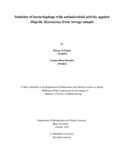Isolation of bacteriophage with antimicrobial activity against Shigella Dysenteriae from sewage sample
Abstract
Shigellosis infection, caused by a genus of medically important bacteria called Shigella, results
in diarrhea and other painful manifestations in humans. Annually, an estimated 74,000 to
600,000 people die of Shigella infection worldwide. Among the most lethal species of Shigella is
Shigella dysenteriae, which produces the Shiga toxin upon infection. As a treatment, several
antibiotics are prescribed to the patients suffering from shigellosis. However, recent studies have
shown Shigella dysenteriae, along with several other species of bacteria, to have developed
resistance against the common antibiotics; and, many of them were multidrug-resistant. In order
to counter this problem, widespread research is ongoing in attempts to develop treatments of
Shigellosis alternative to antibiotics intake, including phage therapy. Phage therapy is the
therapeutic use of bacteriophages in treating bacterial infections. The initial step in the long
process of developing successful phage therapy against a particular pathogenic infection is the
isolation of phage(s) from the environment. In this study, we have isolated bacteriophages from
hospital sewage and confirmed the phages’ antimicrobial activity against ATCC strains of
Shigella dysenteriae.

